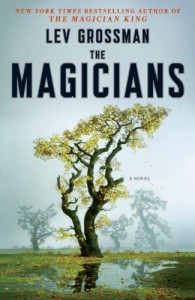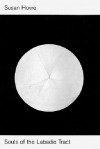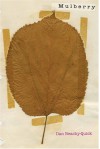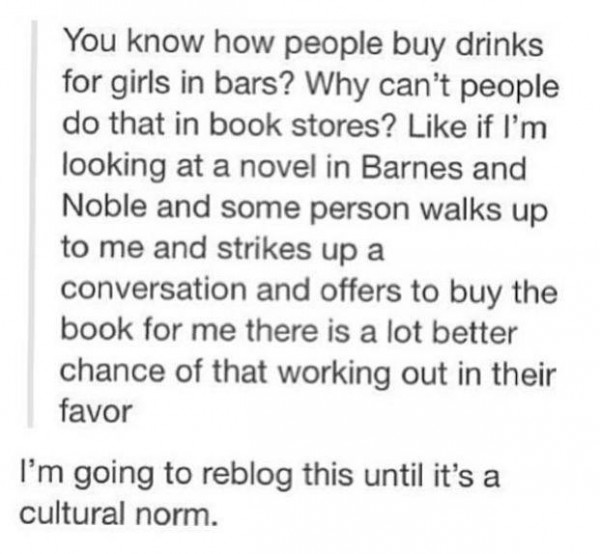Currently reading
The Magicians

This is the second time that I've attempted to read The Magicians and the second time I've had to put the book down.
The first time, I quit a few paragraphs in, after Quentin (our white, cishet, whiny lead male character) is lamenting about how is friend Julia has essentially "friend zoned him" and his dating his best friend and is therefore unwilling to sleep with him. UGH.
I've made it quite far this time, holding out on the hope that it would get more bearable and manageable and frankly, interesting.
This is surprising to me, considering that this book is lauded as the Harry Potter for adults. It's a Narnian-esque world of sex and drugs - but I find that magic - what seems to be the entire premise of the book, is virtually skimmed over.
Another disappointing fact - where Hogwarts seems to be all inclusive (at least, in terms of magical ability), Brakebills is as elitist as it comes. Rather than focusing on teaching magic, the school and it's students seem to mainly be working on increasing their snobbery.
Perhaps what is most annoying about the text (other than the obnoxious white sexist boy narrative) is the fact that Grossman seems to tell rather than show. Granted, I haven't read it all, but I've read enough of Quentin's school years to know that they are barely brushed upon - there is a lot of "And then, it was surprisingly their next year in school."
Also - I'm only going to point out that the characters have sex as arctic wolves at one point. That really needs no further discussion.
I really wanted to give this book a try and give it a second chance. Unfortunately, I find it extremely underwhelming and not worth reading.
Red Rising

I read this book because Buzzfeed told me to - they said this author was going to be the next literary superstar (at least in plot-driven fiction novels). His genre is dystopian fiction - which I love along with everyone else right now. I love reading young writers - people that are just a little bit older than I am. I love seeing what they have created. It's inspiring to me, and gives me hope that I can achieve as well. Pierce Brown is only 26, and apparently already has a movie deal for the book, so my interest was immediately piqued. This must be some book, I thought to myself.
Red Rising from a strictly plot-based perspective is fairly interesting. The first part bogs down a little bit, but basically shit happens, the main character gets mad and invested, transforms into a superhuman, and then a sort of winner-takes-all Hunger Games thing happens where everyone is literally fighting each other to win prestige. It's a little cliche, but I appreciated the Greek gods theme that played into the storyline. As a dystopian novel, it does introduce something new I think. The caste system in Brown's world is beautifully intricate and interesting to think about. I can honestly say that this is one of the first books that I have read in a long while that has kept me up past my bedtime to read, so it definitely has that going for it.
What I cannot get behind is a. how sexist; b. how heteronormative/homophobic; c. how white this book is. Considering that the book is written by a young, white male, this is not surprising. It is, however, disappointing.
a. Several things point to this book being sexist/heteronormative/homophobic.
From the beginning, there are lists of things women can't do. Women wouldn't eat if their husbands didn't work for them. Women can't go down into the mines - that requires a man's touch. Blahblahblah. Later, as the novel progress (and the main character moves into a higher caste), women are allowed to engage in the same behavior as men - war making. Still, though, women are seen as lesser than the men. Any real villain that the main character faces is a man, not a woman. Women are easily outwitted and defeated. The primary insults against a man are just like they are in today's culture - someone cries like a girl, or is as weak as a woman, or is a "pricklicker". That last insult, I believe, points to the heteronormative attitude of the book and disparages both women and gay men. There is also noticeably a lack of anything but straight people in this book, though there is the token "effeminate" man who makes our sexist hero, Darrow, into a dazzling, glorious token of male perfection.
The most important part I can point to in the novel is how the characters treat rape. During what I'll call the Hunger Games portion of the book, a lot of women get raped or get almost raped. Characters say, "Oh, that's just war." More troubling is Darrow's treatment towards a man who attempts rape, but is prevented. At this point, Darrow has already executed someone for rape and apparently the near victim doesn't want any action to be taken against the man who nearly harmed her. Darrow has the man whipped for his crime. And then, to illustrate some kind of point, he has the perpetrator whip him - Darrow - to show that the tribe's actions affect them all. Afterwards, all is of course forgiven and the near rapists becomes one of Darrow's most loyal followers. I'm not sure what this is to illustrate other than the fact that author writes a world that is a boy's club. I found this part disturbing and somewhat rape apologist.
The hero's lady, nicknamed Mustang, of course gets kidnapped by the bad guys and he has to storm in and rescue her. She does comment on this with something along the lines of, "Oh, I became a damsel in distress? Man, I hate those girls." Mustang and our main character's first love interest, Eo, both function as the Manic Pixie Dream Girl - beautiful, perfect, inspiring women who encourage Darrow to do great things and become the hero he is destined to be.
Misogyny transcends, apparently, all levels of the caste system from Red where Darrow begins to Gold where he ends up. Along the way, we meet creative Purples who "create" women (ie, give them literal angel wings) for their sexual pleasures. Pink is the caste of pleasure - and there are all sorts of insults related towards being a Pink, let me tell you.
b. Pretty sure that there are no people of color in this book. It felt decidedly white-washed. It may need a closer read - but why should we have to read between the lines to find diversity in our novels? Of course, the elite, ruling class (and basically everyone in the majority of the book) is white and blond - the Gold Class in the caste system.
Mostly all of them are incredibly attractive, by the way. Nothing will piss me off in a novel more than the author's need to assert that the main character is attractive. WHO CARES. Marie Lu's Legend did the same thing and it's obnoxious. A person is not more valuable simply because they are attractive, and I am not going to love a character more because they are good looking.
These two factors (though, if I'm being honest, primarily the first one) ruined the book for me. I can't even describe how many times I headdesked over this book and it's misogynistic white male writing. The plot was interesting - but the ideas presented are nothing fresh or new. We already live in a misogynistic, heteronormative, homophobic, white-washed dystopia. Writing a book that seems to celebrate or promote this fact does absolutely nothing to challenge the system and Red Rising is frankly a disappointment that will mostly likely be largely promoted.
Let's not, however, make the mistake of putting Red Rising in the same category as The Hunger Games as the reviewers have because it in no way challenges what terrible parts of society we already experience - it embraces them.
don't bend me, don't mold."
When Film Adaptations are Better than the Books
Last night I saw Catching Fire with my brill friends Kirsten and Justin (they have great BookLikes pages, too!). For just the second time in my life, I'm finding that I liked the movie version better than the book. The first time was The Graduate, because the book read like a screenplay and it was better to see Dustin Hoffman deliver the lines. The same feels true here.
Throughout The Hunger Games series, Suzanne Collins's writing is notably subpar.
I may never recover from this Hunger Games line from Katniss, "I avoid looking at anyone as I take tiny spoonfuls of fish soup. The saltiness reminds me of my tears." The writing is a mess, but the concepts are killer.
The framework is there, but the method of delivery doesn't translate particularly well in its original form. The books feel like they should have come after the films, as a kind of bonus transmedia tie-in. In the films, the characters have more depth, motivation, and pathos than they ever did in the novels.
I'm not sure what to make of this. Do you think it matters? I'm glad the books exist and that, cringe-inducing as they may be, I can revisit them and experience the story in its novelized form. But the quality of the writing is insulting, especially given the target audience. Teenagers are capable of consuming high quality narratives; to assume otherwise is misguided at best.
I love The Hunger Games. I truly do. I think there are important layers of cultural commentary. These books have sparked interesting conversations amongst my friends and family. (i.e.: my older sister would not hesitate to volunteer in my place but I honestly think I lack the gumption to do the same.) I'm glad these books have given me those interactions. I still wish they were better. What do you think?
***
I so strongly agree with this (and not just because I am friends with this loveliest of Lyd-Squids). Frankly, I usually always fall into the "books-are-better-than-the-movie" faction (#divergentreference). For example - I still haven't seen all of the Harry Potter film adaptations. They just don't compare to the actual literature. I probably will see them all eventually (thank you, ABC Family, for your Harry Potter marathons.)
I love The Hunger Games film adaptations. Rarely do I see characters that are more developed on film than in text, and I find that both sad and kind of remarkable.
What I find problematic is just what Lydia said - teenagers are capable of consuming high-quality, well-thought, and well-written stories. Just because a novel is plot-driven does not mean that it cannot also have characters that have more depth than the flat paper their lives are written on.
I want more for Young Adult lit. I want awesome stories - but I want characters that mean something as well. I want there to be narratives of love stories that aren't just flinging two characters together and having them magically fall in love (ie, Divergent and Matched). I believe that readers deserve better than the publishing industry is currently delivering.
 2
2
green with the flare of life in it
and if I hold this end, you the other
that means it's broken
broken between us, broken despite us
broken and therefore dying
broken by force, broken by lying
green, with the flare of life in it"
"The Art of Translation, 2" - Adrienne Rich
 1
1
 1
1
Emma Approved Premieres Monday!
I'm excited for the new Pemberley Digital adaptation. Welcome to Sanditon fell short in my eyes, but The Lizzie Bennet Diaries was so great it's become the topic of my Master's Thesis. I have a good feeling about Emma!
So excited!
28 Things That Happened After the Harry Potter Books Ended
For your daily cry.
Waylaid

Last night, I dreamed that I was in the Hunger Games with my friend, Lydia. I was then inspired to watch the trailer for Catching Fire which comes out in November.
And thus, I am now re-reading the book - completely waylaying my reading plan. I'm supposed to be working towards being more well-read, not re-reading not-very-well-written-but-still-fun-to-read books for teens.
Which I guess brings me to a point - yes, definitely, reading should be a tool to learn, and grow, and to challenge oneself with. But it should also be enjoyable, and sometimes a reader needs to read a little fluff.
 1
1
took root became the many-tendriled sound.
What haunts the ground haunts me, its ghostly art
to coil round where silence was, remand
quiet to the hum. Where words are indistinct
/shut up/ where words /they can't/ betray themselves -
indifferent contradictions, mouthed or inked.
No matter, we all betray ourselves, or loves. "
"The Dark Octaves", Sanderlings - Geri Doran
 1
1
Super Sad True Love Story Super Sucked

Here is a tale celebrating the white chauvinist male once again! Lenny, a 39-year-old manchild with an Asian fetish, gets by in life by being "a nice guy". He's decently smart. He has a good job. He's not particularly attractive, but what he lacks in looks he makes up for in sugary sweetness. He's a nice guy! He sort of gets the girl! He's the only one with a "moral" compass in the entire book! Definitely a character worth celebrating.
God. Perhaps it's best to look at this book as an entire critique on all things American. perhaps Gary Shteyngart isn't actually promoting a sexist manchild as the hero of his story. Regardless, Lenny is probably one of my least favorite main characters. I don't find any redeeming qualities about him, and I thoroughly distrust a portrayal of "a nice guy" character.
The sexual politics of this book are disturbing, which is perhaps the intent. There is not one female character that isn't entirely flat. Lenny idealizes his women - Eunice, his mother, and Grace, the "perfect" woman he can't have. None of these women feel at all real - they are completely characterizations.
When considering that this is written as a dystopian novel, I think that the characterizations do feel apt. The book demonstrates what the author sees as the destruction of America - the country literally falls apart when China decides to collect on America's debt. It shows zero progression in terms of equality - women are still objects (and now they wear see-through pants), rich white people still rule the world, thinness is still ideal to a ridiculous point (Eunice calling herself fat, for example), etc. This indeed is a future I believe we all hope to avoid.
I think it is correct to feel so disgusted by a book showing a dystopian future where the patriarchy is still alive and kicking and still subjecting women to complete bullshit. I think it's correct to feel disgusted by a character who is the very representation of this patriarchy and the unfair power structures in the book and who doesn't even realize his privilege or do anything to challenge it. I think it is correct to reject this book and the future it seems to forecast - to take it's fears and problems and consider them - and to make a better, more equal future for ourselves.
When you're required to read a book and it turns out to be THE WORST:

#THEWORST









 2
2




